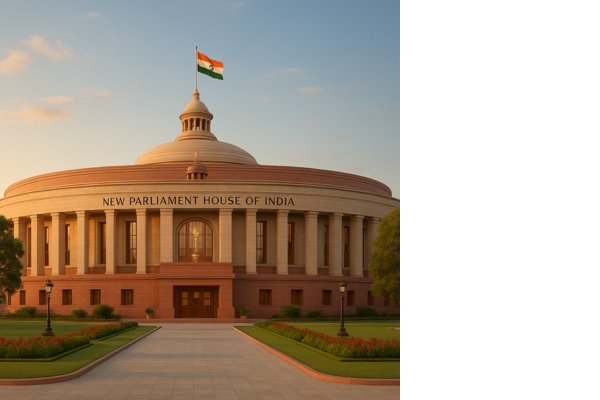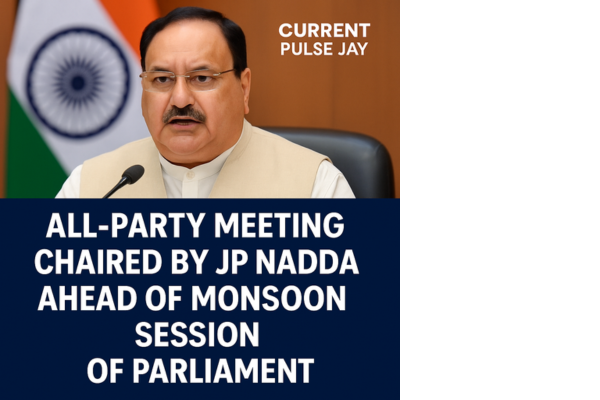Introduction
JP Nadda since 2020 and the member of the Rajya Sabha representing Gujarat since 2024. A key decision maker of the BJP, he is a close aide to Narendra Modi. The all-party meeting chaired by JP Nadda ahead of Monsoon Session of Parliament held on July 19, 2025, marked a pivotal moment in India’s political calendar. This high-stakes gathering set the stage for the upcoming Monsoon Session, shaping legislative priorities and signaling bipartisan intent—or division—on crucial matters.
Why the All-party Meeting Matters
Context of the Monsoon Session
The all-party meeting chaired by JP Nadda ahead of Monsoon Session of Parliament was convened to ensure smooth legislative functioning. As the largest parliamentary gathering ahead of the session, its significance cannot be overstated.
- Agenda Setting: Key issues—including the agricultural reforms rollback, defence procurements, and women’s reservation bill—were tabled.
- Cross-Party Dialogue: The meeting fostered discussions among parties, encouraging collaborative policymaking.
- Parliamentary Harmony: Historically, such all-party meetings reduce friction and help preempt disruptions during legislative proceedings.
Why JP Nadda Was Chosen as Chair?
JP Nadda, the BJP President and former Union Minister, took charge with strategic foresight. His leadership in the all-party meeting chaired by JP Nadda ahead of Monsoon Session of Parliament demonstrated:
- Political Authority: Nadda’s standing allowed him to moderate candid debates.
- Consensus Building: His experience enabled him to balance diverse viewpoints and maintain order.
- Trust Factor: Opposition leaders were more receptive due to Nadda’s neutrality in procedural matters.

Main Issues Addressed
Agricultural Reforms Update
At the all-party meeting chaired by JP Nadda ahead of Monsoon Session of Parliament, the rollback of contentious farm laws took center stage.
- Status: Although repealed, numerous farmers’ demands—guaranteed MSP, electricity subsidies—remain unmet.
- Deliberation: Opposition parties pressed the BJP-led government for timelines and guarantees.
- Outcome: A working group was proposed to monitor farm reforms, set to report back mid-session.
Defence Procurements & Strategic Readiness
India’s heightened geopolitical tensions were debated under the all-party meeting chaired by JP Nadda ahead of Monsoon Session of Parliament banner.
- Key Deals: Discussion included procurement of artillery and naval frigates.
- Opposition’s View: Called for parliamentary oversight mechanisms.
- Resolution: Defence Minister assured the house that transparency would be prioritized during clause-by-clause scrutiny.
Women’s Reservation Bill
The push for the Women’s Reservation Bill received renewed focus at the all-party meeting chaired by JP Nadda ahead of Monsoon Session of Parliament.
- Cross-party Backing: Several opposition leaders expressed conditional support.
- Stumbling Blocks: Reservation percentages and state-versus-national election dynamics emerged as sticking points.
- Next Steps: Formation of a joint committee to refine the bill’s scope and implementation roadmap.
4 Key Outcomes from the Meeting
Consensus on Order of Business
The all-party meeting chaired by JP Nadda ahead of Monsoon Session of Parliament agreed on the Monsoon Session agenda:
- Discussion on farm policy review
- Introduction of women’s reservation bill
- Debate on defence and security-related legislations (e.g., defence exemptions)
- Supplementary budget discussions
Mechanism for Dispute Resolution
The meeting underlined the need to:
- Establish a nodal committee (to meet daily during the session)
- Use this committee to preempt disruptions
- Expedite approval of bills without unnecessary adjournments
Parliamentary Peace Accord
A non-binding “good faith” agreement was signed, committing all sides to:
- Avoid walkouts unless procedural objections
- Respect speaking quotas
- Submit amendments in time for scrutiny
Implications for Indian Politics
Strengthening Parliamentary Democracy
By emphasizing dialogue and pre-session coordination, the all-party meeting chaired by JP Nadda ahead of Monsoon Session of Parliament:
- Reinforces institutional probity
- Signals a shift from adversarial to constructive politics
Electoral Significance
Upcoming assembly and civic polls across multiple states raise the stakes:
- Opposition aims to showcase collaborative policymaking
- BJP highlights governance efficiency, leveraging the meeting to appeal to moderates
Governance across Party Lines
While the all-party meeting chaired by JP Nadda ahead of Monsoon Session of Parliament indicates unity, skeptics question its long-term substance.
- Will BJP honour compromise beats?
- Can the opposition avoid obstructionism?
Table – Snapshot of the Meeting
| Issue | Outcome |
|---|---|
| Agricultural reforms | Working group to monitor farm law rollback |
| Defence procurement oversight | Ministerial assurance to increase transparency |
| Women’s Reservation Bill | Joint committee to refine bill scope |
| Session agenda | Consensus on order of business |
| Session conduct | “Good faith” accord to minimize disruptions |
Expert Commentary & Stakeholder Views
BJP’s Position
According to party statements, the all-party meeting chaired by JP Nadda ahead of Monsoon Session of Parliament:
- Demonstrates BJP’s willingness to engage across the aisle
- Reinforces its commitment to Parliament as the central institution for policy-making
Opposition’s Response
Leaders from the Congress, TMC, SP, and others acknowledged the gesture but stressed:
- The need for actual policy follow-through
- Concern over selective cooperation vs. political grandstanding
Analyst Perspective
Political experts argue the meeting could:
- Reduce session-time wastage
- Set a new standard for pre-session coordination
- Or, become merely symbolic without concrete deliverables
Connecting the Dots – What Comes Next?
Watching the Monsoon Session
As the all-party meeting chaired by JP Nadda ahead of Monsoon Session of Parliament set the tone, the next step is session performance:
- Will parliamentary productivity rise?
- How will contentious bills play out?
Media & Civil Society Role
Media echo the all-party meeting chaired by JP Nadda ahead of Monsoon Session of Parliament as a potential trend-setter, urging:
- Civil society scrutiny
- Transparent reporting of session proceedings
- Fact-checking of any deviations from the “good faith” accord
Internal & External Links for Further Reading
Internal Link: Explore our coverage on the previous Winter Session Highlights.
- External Links:
- Read more about JP Nadda’s political journey from Union Health Minister to BJP President on BI’s profile of JP Nadda.
- Understand Monsoon Session protocol via the Indian Parliamentary website.
Final Thoughts
The all-party meeting chaired by JP Nadda ahead of Monsoon Session of Parliament may go down in history as a turning point for Indian parliamentary culture. Whether it results in streamlined legislative progress or fades into tokenism depends on the diligence of MPs and the media’s watchdog role. What’s certain is this:
- It reinforces that complex policymaking demands cross-party dialogue
- It may reshape the way Parliament approaches contentious issues
- It opens up possibilities for a healthier legislative environment—not just this Monsoon Session, but beyond.
Stay tuned with our website “ Current Pulse Jay ” to our updated coverage as the Monsoon Session unfolds. Let us know which outcome most interests you: farm reforms, defence transparency, women’s reservation, or parliamentary decorum—and we’ll bring you deeper insights and expert opinions.
FAQs – All-party Meeting Chaired by JP Nadda Ahead of Monsoon Session of Parliament
1. What is the focus of the all-party meeting chaired by JP Nadda ahead of Monsoon Session of Parliament?
Answer: The meeting focused on forming consensus on the Monsoon Session’s agenda—covering farm reforms, defence procurement, women’s reservation bill, and session conduct norms.
2. Who attended the all-party meeting chaired by JP Nadda ahead of Monsoon Session of Parliament?
Answer: Representatives from national parties (BJP, Congress), key regional parties (TMC, SP, DMK), and independent MPs participated under JP Nadda’s stewardship.
3. What decisions were made during this all-party meeting chaired by JP Nadda ahead of Monsoon Session of Parliament?
Answer: Participants agreed on a working group for farm policy, a joint committee on women’s reservation, transparency in defence, and a “good faith” accord on conduct during the session.
4. How will the all-party meeting chaired by JP Nadda ahead of Monsoon Session of Parliament impact legislative business?
Answer: By streamlining agenda approval and minimizing disruptions, it aims to accelerate lawmaking and set a collegial tone for the session.
5. Will the all-party meeting chaired by JP Nadda ahead of Monsoon Session of Parliament resolve existing political tensions?
Answer: While it establishes goodwill, the real test lies in whether agreements are upheld during heated debates and votes later this week.
6. Has JP Nadda chaired similar all-party meetings before?
Answer: Though numerous all-party meetings took place under Ministerial leadership, this one is significant due to Nadda’s position as party chief ahead of crucial parliamentary business.

